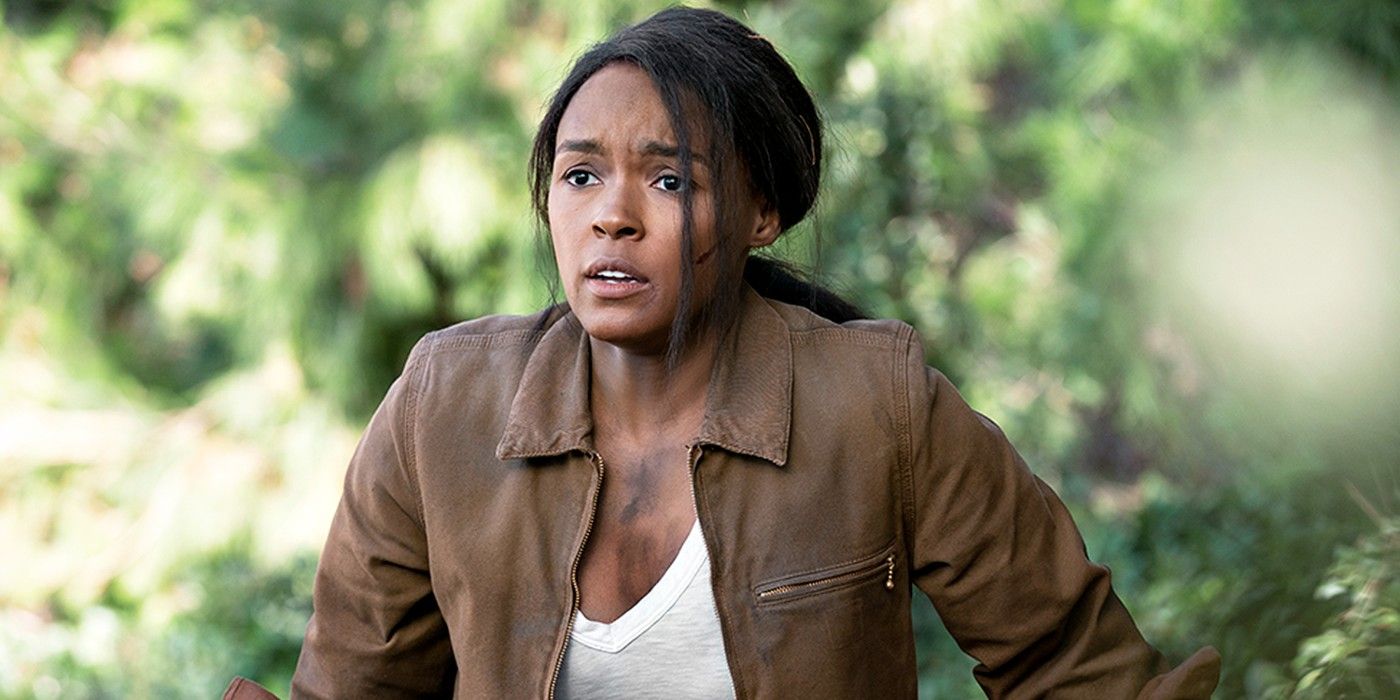Some of the strangest continuations of the art house genre in recent years have appeared, not in small theaters in select cities, but broadcast on cable and streaming networks. Series like Twin Peaks paved the way for the weird to the point that in recent years even a major MCU property like WandaVision exhibited surreal sensibilities.
In honor of the more mindbending moments of modern television, these are some that made us take a second to check our IDs and make sure that we really are who we say we are.
Black Mirror: Bandersnatch
If there is a show in recent years that has positively delighted in making its viewers question their realities, it's Black Mirror. Kicking off with scathing political commentary in its very first episode, the series incorporates news items and takes them to their sci-fi extreme, giving audiences something that is both fantastical and yet seems uncomfortably real. Leaning hard into cynicism, it's not always a pleasant watch, but it is a vital one.
The culmination of many of the series' themes came along with Bandersnatch, the interactive Choose Your Own Adventure style episode that allowed its viewers to click through various options to get its hero from point A to point Z. The retro stylism helps sell the story as it pops us back to the early days of video game development and introduces us to a protagonist that is very much his own worst enemy.
The Twilight Zone - Season 2, Episode 5 "Among the Downtrodden"
Countless shows, movies, and franchises have shown unpopular kids who end up with special powers or abilities that make them stand out and allow them to flip the script of life. Suddenly strong enough to stand up to their bully or kind enough to help others, this is the superhero trope in a nutshell. Yet, what if the person who ended up with psychic abilities was the last person you'd want to have them?
Jordan Peele's Twlight Zone overall did a great job of modernizing the concept while keeping the morality of the original series in place. Simply by subverting a number of "bullied kids get one over on the mean girl" tropes, this episode became an all-timer, not just of the new series but of any era's Twilight Zone.
Westworld - Season 1, Episode 10 "The Bicameral Mind"
Based on the 1973 film written by sci-fi novelist Michael Crichton, Westworld introduced its audience to an AR world in which wealthy patrons were invited to live out cowboy fantasies. The concept is a bit trippy in and of itself, but the creators didn't waste any time going fully off finding new ways to challenge our perception of even basic concepts we generally take for granted, like "what makes a person," "does free will exist," and "will good triumph over evil?"
This episode was full of so many shocking reveals that it's hard to cite just one, but a piece of it was the ongoing saga of Maeve (Thandiwe Newton) and the way a trauma she can't forget leads her to greater self-awareness. Yet, that still doesn't necessarily grant her free will, adding an element of tragedy to her actions. It's true that Westworld slid a bit off the rails in its third season, but after what was an essentially perfect first season, it's hard to go up from there. The whole show was full of twists that made us do double-takes, but "The Bicameral Mind" remains an undisputed entry in the world of reality warping TV revelations.
Rick & Morty - Season 2, Episode 1 "Total Rickall"
Much of Rick & Morty's success comes from the show's willingness to lead into countless sci-fi tropes in order to create a parody that simultaneously offers up commentary on the genre. Utilizing the "brilliant, quirky scientist" trope with Rick, the show questions his willingness to play with the lives of others at every turn.
Again due to some of Rick's ethically questionable wanderings, his family comes up against an alien parasite that drops fake memories into their minds, creating a series of random new characters that they all feel great affection for, only to discover the characters aren't real and are part of an actually quite malicious illusion. This gets more or less sorted out by the end, but it certainly left us wondering if Rick was just an invention of a shared delusion.
WandaVision - Season 1, Episode 2 "Don't Touch That Dial"
The first episode of WandaVision leaned heavily into the black and white sitcom references while the second episode was where we started to see in earnest the edges of Wanda's reality fray. Utilizing a classic sitcom trope of a last-minute talent show, the episode sees Wanda and Vision attempting to fit in, only to prove beyond the shadow of a doubt how much they don't.
WandaVision changed how we see the American housewife, but it's also a series that asked its viewers to look within. Wanda's overall need for approval shines through here, but so does her unnerving desire to uphold an illusion regardless of whom it hurts in the process. When a bright red helicopter breaks the town's border, the reaction is horror as the audience and the other characters alike began to realize that something is very, very wrong.
The Good Place - Season 1, Episode 13 "Michael's Gambit"
Even if you've never seen The Good Place, chances are you know the reveal of the final episode of its first season. After spending the entire season attempting to hide her lack of suitability to be in "the good place" after being a mostly bad person in life, Eleanor uses her bizarre but strangely prescient logic to deduce that they've all been in "the bad place" all along.
The revelation inspired countless memes, with Eleanor pointing at the head honcho of "the good place" and declaring, "THIS is the BAD place!" However, the moment that comes immediately after, in which Micheal lets out a devious laugh is the part that made us realize that we had been living in a fantasy land for the entire duration of the show thus far.
The Haunting of Hill House - Season 1, Episode 6 "The Bent-Neck Lady"
Ostensibly based on the novel of the same name by Shirley Jackson, this series reimagined the characters introduced in the novel as siblings that lived in a haunted house for a time as children. Each of them remains traumatized by the events well into adulthood, and they are brought together again to attend their sister's funeral.
As children, they were haunted by a ghost that they called "the bent-neck lady," and knowing that their sister and mother both died at Hill House haunts them. When they look back over Nell's life, they slowly piece together horrible new truths.
Twin Peaks - Season 3, Episode 18 "What is Your Name?"
Fans of Twin Peaks waited for an awfully long time to see the continuation of the series, and most would agree that The Return delivered. Bringing back a lot of the old crew and introducing some new characters, each episode followed Special Agent Dale Cooper, whose body, spirit, and Doppelganger are all running wild.
Though Twin Peaks could be a surprisingly sweet series, it's best-known for its ability to combine dreaminess, horror, and soap opera with an undeniable aesthetic. Rather than leaning into a tidy conclusion, this episode embraced the mess and went all the way into an alternate reality.
Homecoming - Season 2, Episode 7 "Again"
The first season of Homecoming featured some genrebending loops that left a lot of jaws on the floor as a woman named Heidi who once helped soldiers reacclimate to civilian life realized her memories didn't tell the full story of her life. The second season continued the theme by introducing us to Jaqueline, a woman who awakens in a boat in the middle of a lake with no memory of who she is.
Our hero races to understand what happened to her and why, which is linked to the memory loss drug that blurred Heidi's memories in the first season. Yet, the twist is something a little scarier, making this season not just a wonderful continuation but also a great story in its own right.
Mr. Robot - Season 1, Episode 8 "eps1.8_m1rr0r1ng.qt"
The basic premise of Mr. Robot is already a little wild before we even make it to any of the twists. Elliot works as a programmer whose job is to keep a company's cyber-security up to snuff, but he's then hired by a mysterious figure to help take down the self-same company as a hacker. Generally good intentioned but an extremely unreliable narrator, he finds himself unwittingly stuck as a player in a game greater than his understanding or control.
With that level of built-in questioning of one's reality, it should come as no great surprise that the first season of the series was chock-full of twists. This episode confirmed the fan theories of many when it revealed that the enigmatic Mr. Robot was in some ways a figment of Elliot's imagination, but the most important part of this episode was showing us some of Elliot's often-hidden emotional pain.

-1.jpg)
.jpg)
-1.jpg)
.jpg)
.jpg)

.jpg)
.jpg)

.jpg)